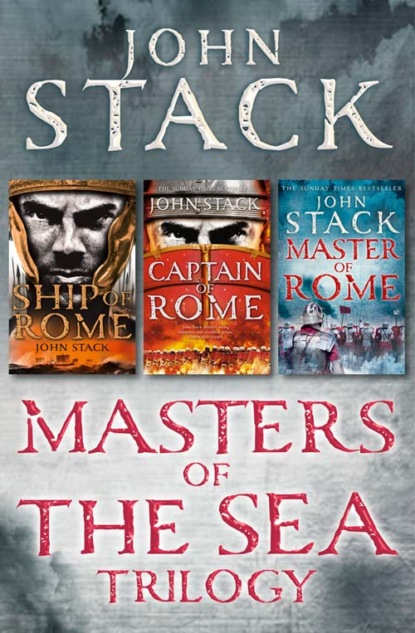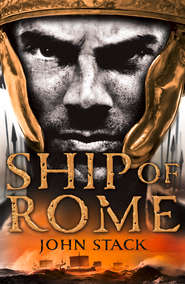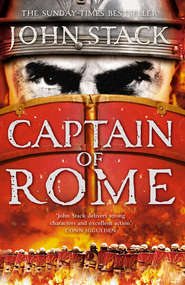По всем вопросам обращайтесь на: info@litportal.ru
(©) 2003-2025.
✖
Masters of the Sea Trilogy: Ship of Rome, Captain of Rome, Master of Rome
Автор
Год написания книги
2019
Настройки чтения
Размер шрифта
Высота строк
Поля
‘Starboard side, withdraw!’ Atticus roared, before taking off in a run towards the foredeck.
The order carried clearly to the slave deck and the drum master repeated the order to the starboard-side rowers. The slaves immediately stopped their stroke and pulled the oars in hand over hand. Within an instant the oars were withdrawn, with only their two-foot-long blades exposed outside the hull.
Gaius leaned the rudder slightly over to converge the two ships and the cutwater of the Aquila’s prow tore into the extended starboard-side oars of the Elissar. The rowers of the Elissar were thrown from their positions like rag dolls as the fifteen-foot oars they manned were struck with the force of the seventy-ton Roman trireme travelling at eleven knots. Many of the oars splintered, while some held together to strike the slave at the handle end of the oar. In the confined space of the slave deck, with the men chained to their positions, there was nowhere to run to, and by the time the Aquila had run the length of the Elissar, the starboard-side slave deck of the Carthaginian galley was strewn with broken bodies.
‘Grappling hooks!’ Septimus ordered as the Aquila’s foredeck came in line with the enemy’s aft. Immediately three of his men threw the four-pronged hooks across the narrow gap between the galleys. As the hooks found purchase on the Elissar’s deck, the marines clambered to grab hold of the attached ropes and pull with all their might. The gap was closed to less than six feet. Septimus ran forward and jumped on the starboard rail, balancing easily with his gladius in one hand and rounded hoplon shield in the other.
‘Men of the Aquila, to me,’ he shouted, and jumped the gaping void beneath the two galleys, landing solidly on the aft-deck of the Carthaginian ship.
The marines roared as the blood lust of battle overwhelmed them and they followed the centurion without hesitation over the rails of the enemy ship, clamouring to be the first to draw Carthaginian blood. Septimus barged straight at the man nearest him and struck him squarely with his shield, using his momentum to knock the man off his feet, sending him reeling into someone behind. The few Carthaginians remaining on the aft-deck fled before the charge. Behind the marines, Atticus and Lucius jumped onto the deck of the Carthaginian galley, axes in their hands. Their task would take only minutes, time Septimus and his men would have to buy with their blood.
The war cries of the marines spilling over the rail of the Elissar fuelled the frustration within Gisco at the sudden reversal. The air around him was filled with the screams of injured and dying men while beneath his feet the deck still reeled from the impact of the Roman trireme’s run against the starboard-side oars of his galley. The ranks of his men had disintegrated under the hammer blows of the pila volley, and they were in chaos, with neither focus nor formation.
‘Men of the Elissar to me!’ Gisco bellowed as he charged from the foredeck. The veteran soldiers reacted more swiftly than the untested, and so the line of attack was ragged and uncoordinated, but their ferocity bore them on in a headlong rush along the length of the Elissar. They struck the line of Romans at full tilt, their momentum checked within a stride by the near-solid wall of shields.
Gisco sidestepped a thrust from a Roman marine before countering the stroke with a slash to the Roman’s thigh. The man yelled in pain as the sword bit deeply into the flesh, but before the admiral could deliver the killing blow his sword was stayed by another Roman, who followed the parry with a vicious attack. Gisco immediately realized that although each of the Romans fought as one man, they also fought as a team, overlapping their attacks, their coordination sapping the strength of the Carthaginians’ original charge. Gisco renewed the surge of the counterattack, urging his men on through the ferocity of his own charge. The Elissar would not fall easily.
The Carthaginian war cries reached a new high as another lunge was made in an effort to break the Roman line of battle. The sound spurred on Atticus and Lucius and sweat streamed from their bodies as they redoubled their efforts to sever the tiller from the rudder. The weathered toughened timber was as hard as iron, but with each axe blow small chips flew away and already they were halfway through the four-inch-diameter section.
On the main deck, Septimus saw a breach developing and immediately fed his best fighters into the gap. Within the space of two vicious minutes the gap was sealed once more and the tide of Carthaginians checked. The last of the reserves were now engaged. The next breach could not be held. If the Carthaginians broke through, the fight would become chaotic and all chance of a withdrawal would be lost.
The tiller finally parted under the blows of Atticus and Lucius. Now, even if the Carthaginian galley managed to get back under way, the loss of her rudder would render her useless.
‘Septimus!’ Atticus roared. ‘Withdraw!’
Septimus heard the signal. ‘Fighting withdrawal!’ he roared, his men instantly stepping back towards the aft-deck.
The sudden break-off in resistance threw the Carthaginian attack and a gap opened between the lines.
The twenty triarii who had remained on the Aquila now loosed volleys of spears into the flank of the Carthaginian forces, checking their advance, allowing the marines vital seconds to mount the aft-deck rails and recross onto the Aquila. Within moments the bulk of the marines were aboard, with just a small knot remaining, Septimus amongst them. Under an almost constant volley of spears, the Carthaginians reared up in attack again, their centre driven by a demonic commander, rage emanating from his frame as he tried to cut off the remaining marines. The lines of the grappling hooks were severed as Septimus jumped across the opening gap, the last man to do so.
Gisco could only look on in futile rage as the Roman galley re-engaged her oars, hastening her escape. The Carthaginian fleet was still two thousand yards away, too far behind to stop the Romans reaching the mouth of the strait. All around him his men stood at the side rail of the aft-deck, shouting defiance and insults of cowardice at the Romans. Gisco remained silent, his eyes searching the rails of the enemy ship. The two men he sought were on the foredeck, standing side by side, the taller man, the marine centurion, recognizable from the fight. They were the commanders and he instantly saw they were watching him intently. Gisco burned the images of their faces into his mind. As the gap opened to one hundred yards the Roman galley began to come about to resume her course northwards.
‘Aquila,’ Gisco read on the stern of the galley.
Gisco made a silent promise to the gods that one day he would hunt down that ship and have his revenge on all who sailed on her.
CHAPTER TWO (#ulink_ac4c17eb-9bb2-5637-ba72-39bb2ec85d87)
The sail billowed out with a crack as the trailing wind filled the broad canvas sheet, the running rigging straining against the pull. Within an instant the Aquila was propelled to fifteen knots, its cutwater tearing through the sea, throwing a spray of water across the foredeck. The running of a galley required immense skill and concentration, and Atticus noticed the iron look on Gaius’s face as he fought to keep the helm true. One slip and the galley’s stern would swing through the line of the wind. The sail would be exposed to unequal stresses, instantly snapping the rigging and collapsing the canvas. Worse still, if the rigging held, the galley would capsize under the press of wind.
Atticus watched in silence as the experienced helmsman struck a delicate balance between the prevailing wind and the ship, making the two connect until the galley perfectly matched the wind’s speed and direction. Confident that Gaius had the ship in hand, Atticus looked out over the stern rail to confirm the Carthaginians were not in pursuit. The Aquila was now four hundred yards clear of the headland at the northeastern tip of Sicily. The Punici had not followed beyond the strait.
Atticus was in turmoil as he realized his ship had escaped. Although he had known the only choice had been to flee from the enemy fleet, the retreat from the Carthaginian galley marked the first time in his whole life that he had run from an enemy. The empty sea behind the Aquila mocked the captain for its absence of an enemy and Atticus slammed his fist onto the stern rail. Knowing he had made the right decision was not enough to assuage the dishonour he felt at having fled.
Septimus stood silently by Atticus’s side. Eight marines were unaccounted for from the fight on board the enemy galley, six of them hastati, junior soldiers, many of them in their first battle. He could only pray that all had died under the sword and that none had been left injured on the enemy’s deck. If taken alive their fate would be horrific. The Aquila had been saved because of the sacrifice of those men. Septimus recounted their names silently in his mind.
‘Where are we sailing to?’ he asked finally.
‘To the only port Rome holds on the north coast. To Brolium.’
Septimus nodded, looking ahead over the bow. During his time on the Aquila he had come to accept that the unfamiliar seas around him held many enemies, as had the unfamiliar terrain of Sicily when he had served in the legions. As a legionary he was always confident that he served in the best land army in the world. The sight of the Carthaginian fleet had made him realize that Rome did not enjoy that same superiority and confidence at sea.
Eight hours later the Aquila rounded the eastern headland guarding the approaches to the Roman-held port of Brolium. Atticus stood alone on the bow, preferring solitude as the hours had sped past and league after league fell under the galley’s wake. His thoughts had ranged over every detail of the Carthaginian ships they had fought, every difference, however minute, between them and the vessel under his feet, his mind slowly forming a model of the heavier, stronger galleys that would soon plague the waters off northern Sicily.
A sudden change in the tilt of the deck broke Atticus’s thoughts as Gaius lined up the Aquila to strike the very centre of the hectic waters ahead, crammed with transport barges awaiting a chance to disgorge their contents onto the already crowded docks of the once-quiet fishing town. Even from this distance out, the air around Atticus was filled with the hum of voices from the multitude at work, broken occasionally by the sound of a whip crack as a driver spurred his team of oxen to advance, signalling the departure of yet another fully loaded wagon along the road south to the fortified legion encampment hidden beyond the town.
The scene of docking and departing barges, of unloading and reloading supplies, of man and beast struggling for space on the congested docks seemed completely chaotic, and yet Atticus could sense the underlying order that permeated the entire operation as no voice was raised in anger and everywhere men moved with purpose and intent. The Roman legions had never fought a campaign off the mainland before Sicily, and yet, within a matter of months, the Romans’ ability to bring order and discipline to all endeavours ensured that the legions were operating as if they were but a mile from the city of Rome itself. Atticus could only wonder if any natural barrier would ever exist that could protect a people against the seemingly relentless advance of Rome.
Lucius’s sharp commands cut through the cacophony as the sail was collapsed and made secure and the oars were engaged in the rapidly dwindling sea room of the inner harbour. Again Gaius’s incredible skill was called upon as barge after barge was avoided, their crews shouting warnings and curses as each near collision with the slow, ponderous vessels was averted. Atticus’s gaze swept the dock, searching for an opportunity. He quickly saw one and calculated the angles. It would be tight.
‘Three points starboard!’ he roared, his voice acknowledged by Gaius sixty yards away with a nod and a nimble touch on the tiller as Atticus ran to the main deck to prepare to disembark.
The Aquila aligned her bow with an emerging gap as a barge began to cast off, her now empty hull turning towards the mid-channel. Voices and hands were raised on the docks, calling forward the next waiting barge into the valuable space before one of the taskmasters noticed the Aquila’s intercept course, his realization causing a minor panic as the galley’s unerring intent became apparent. Lucius roared for the barge to give way, his command instinctively followed by the merchantmen of the transport vessel who feared the Aquila’s four-foot bronze ram, and the galley swung deftly into the gap left by the departing barge.
Atticus, Septimus and a detachment of six legionaries ran down the gangway the moment it touched the dock, their determined arrival forestalling any protest from the irate taskmaster.
‘Stand by on station,’ Atticus called to Lucius, who saluted and immediately ordered the gangway raised and the galley to push off from the dock. The six legionaries fell in pairs behind the captain and centurion and together they marched towards the end of the dock, heading to the town beyond. The slave labourers crowding the wharf moved back to allow the armed men to pass; as a knot of them dispersed, Atticus spotted an officer approaching at the head of a contubernia of ten soldiers. He was a tall, gaunt man, determination in his step, his face a mask of fury. Atticus recognized him immediately. He was Aulus, the Brolium harbour master.
‘Who the hell do you think you are?’ Aulus yelled as he moved around the gangway of an unloading barge, shoving his way through the queue of bearers that cut across his path. He checked his step as he recognized the approaching captain, ordering his squad of ten men to halt.
‘Atticus, you Greek dog!’ he smiled. ‘By Jupiter’s balls! What madness is this?’
The two men shook hands, Roman style, each grasping the other’s arm below the elbow.
‘I should have known it was the Aquila; only Gaius could pull off a manoeuvre like that. And Septimus,’ Aulus exclaimed over the captain’s shoulder, ‘still alive, I see.’
Septimus allowed himself a smile at the friendly gibe, knowing Aulus’s dislike of legionaries.
‘We couldn’t wait for clearance, Aulus. We need to see the port commander immediately.’
Aulus was disturbed by the captain’s infectious agitation, something he had never before seen in the young man.
‘Atticus, in Pluto’s name, what’s going on?’ he asked, all trace of humour now gone.
‘Carthaginians, Aulus, a whole fleet of them. At least fifty ships. Bearing north through the Strait of Messina.’
‘A Carthaginian fleet? In these waters? By the gods …’
Instinctively Aulus looked around at the assembled fleet of barges. These vessels and their ability to ply goods between the mainland and Sicily were the key to the entire Roman campaign on the island. But they were slow, ponderous beasts in comparison to galleys. Fifty Carthaginian ships would play merry hell with them.
‘Atticus, this news must reach the legion commanders immediately,’ Aulus said without looking back at the captain, his focus on the barges around him, his mind already picturing their destruction at the hands of the Punici.
‘That’s why I need to speak to the port commander immediately, Aulus. He will be able to speak to the legion commanders directly.’
‘Atticus … Gnaeus Cornelius Scipio is here, in Brolium itself.’
‘The senior consul? Here?’ Atticus asked with disbelief. ‘What’s he doing in Sicily?’









